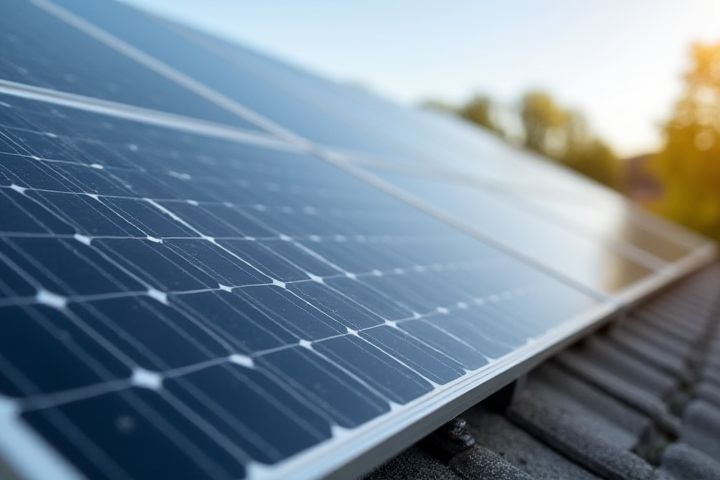
Installing solar panels on your house can significantly reduce your energy bills by harnessing renewable solar energy. By capturing sunlight and converting it into electricity, solar panels provide a sustainable energy source that lessens reliance on fossil fuels. Moreover, a solar energy system can increase your property's value, making it an attractive investment for future buyers. Many government incentives and tax credits are available, further mitigating the initial installation costs. Embracing solar technology also contributes to reducing your carbon footprint, promoting a cleaner environment for future generations.
Why Install Solar Panels On A House
Reduces electricity bills
Installing solar panels on your house significantly reduces electricity bills by allowing you to generate your own electricity from sunlight, which decreases reliance on the grid. As energy prices continue to rise, utilizing solar energy can protect you from increasing utility costs, providing stable and predictable savings. Homeowners can potentially eliminate their electricity bills entirely, depending on the size of their solar system and local energy consumption. Furthermore, many regions offer incentives and tax credits for solar panel installation, enhancing the financial benefits of transitioning to solar energy.
Environmentally friendly
Installing solar panels on your house significantly reduces your carbon footprint, as they harness renewable solar energy instead of relying on fossil fuels. Solar energy systems can decrease greenhouse gas emissions by approximately 3,000 pounds per year for an average household, contributing positively to climate change mitigation. Furthermore, solar panels can lead to a substantial reduction in air pollutants, improving air quality in your local environment. By choosing solar energy, you not only lower your utility bills but also support the transition to a sustainable, environmentally-friendly future.
Increases property value
Installing solar panels on your house can significantly increase its property value, with studies showing an average increase of 4% to 6% in home value for residences equipped with solar energy systems. Homes featuring solar installations can attract more buyers, particularly eco-conscious individuals, which can lead to faster sales. As energy costs continue to rise, potential buyers are often willing to pay a premium for properties that offer energy independence and lower utility bills. Additionally, in some regions, solar panels may qualify for tax incentives and rebates, further enhancing the financial appeal of a solar-equipped home.
Offers energy independence
Installing solar panels on your house enhances energy independence by allowing you to generate your own electricity, reducing reliance on utility providers. With an average solar panel installation yielding 250 to 400 watts per panel, homeowners can significantly decrease their monthly energy bills, often by up to 50%. In regions with high sunlight exposure, annual savings can reach $1,200 to $2,000, translating to substantial long-term financial benefits. By harnessing clean, renewable energy, you contribute to environmental sustainability while gaining the freedom to manage your energy consumption effectively.
Low maintenance requirements
Solar panels require minimal upkeep, making them a practical choice for home energy solutions. Typically, you only need to clean them a few times a year to ensure optimal efficiency, as they are designed to withstand harsh weather conditions and have no moving parts that might wear out. Most solar panels come with warranties ranging from 20 to 25 years, which means you'll enjoy decades of clean energy with minimal intervention. This low-maintenance characteristic not only saves you time but also reduces long-term costs associated with energy production.
Utilizes renewable energy
Installing solar panels on your house harnesses renewable solar energy, significantly reducing reliance on fossil fuels. This clean energy source can lead to a reduction of your carbon footprint by up to 80%, promoting environmental sustainability. Over 1.5 million homes in the U.S. have already adopted solar technology, benefiting from long-term savings on electricity bills--often reducing them by 50% or more. By going solar, you not only empower your home but also contribute to the global shift towards sustainable energy practices.
Potential government incentives
Installing solar panels on your home allows you to tap into potential government incentives that can significantly reduce your initial costs. Federal tax credits, such as the Investment Tax Credit (ITC), offer substantial savings by allowing you to deduct a percentage of your solar installation costs from your federal taxes. Many states also provide rebates or tax exemptions for residential solar energy systems, further enhancing your financial benefits. By leveraging these incentives, you can accelerate your return on investment while contributing to a more sustainable environment.
Provides energy reliability
Installing solar panels on your house significantly enhances energy reliability by harnessing renewable sunlight to generate electricity. This self-sustaining energy source reduces dependence on grid power, especially during peak hours or outages, ensuring continuous power supply for essential appliances. Solar panels also enable homeowners to use stored energy during periods of low sunlight, providing an effective backup solution and minimizing disruptions. By investing in solar energy, you're securing a more dependable and sustainable energy future for your household.
Reduces carbon footprint
Installing solar panels on your house significantly reduces your carbon footprint by harnessing renewable energy from the sun, which emits no greenhouse gases during electricity generation. In fact, a typical residential solar system can offset approximately 100 tons of carbon dioxide over its 25-year lifespan, equivalent to planting around 2,500 trees. By shifting to solar energy, you decrease reliance on fossil fuels and contribute to a greener environment. This transition not only benefits the planet but also positions you as a proactive participant in combating climate change.
Long-term investment benefits
Installing solar panels on your house can deliver significant long-term investment benefits, with an average return on investment (ROI) of approximately 20% over 20 years. Homeowners can expect to save between $10,000 to $30,000 on energy bills throughout the lifespan of the solar system, depending on energy consumption and local rates. Additionally, solar panels can increase property value by approximately 4%, as homes with solar energy systems are often more appealing to buyers. With federal tax incentives ranging from 26% to 30% available until 2032, now is an opportune time to invest in solar technology.
